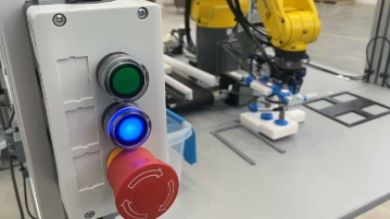When she signed a bill meant to spur renewable energy usage in semiconductor manufacturing, Gov. Kathy Hochul was cautiously upbeat about the status of New York's economy overall.
Inflation was not rising as quickly as it once was nationwide and gas prices had started to tumble, though remain higher than they were a year ago.
"I'm not spiking the football right on this week's trends," Hochul said after approving a measure meant to draft off a massive federal investment in computer chip manufacturing that could boost upstate communities in particular. "I'll continue with preparing for the worst and hoping for the best."
Her Republican rival, Rep. Lee Zeldin, had a far different view of the state's economic picture on Monday when the Federal Reserve released a report finding business activity had fallen and general business conditions saw their second-largest monthly decline.
"Costs are skyrocketing with inflation at a 40-year high, and labor is hard to find," Zeldin said in a statement. "It’s no wonder these businesses are reaching their breaking point. If we do not start addressing New York’s problems, our state will only continue down this path, and our economy will continue to suffer greatly."
The campaign for governor over the last several months has largely hinged on key questions facing public safety and crime — an issue voters this spring identified as a top concern for them.
But the economic uncertainty facing New Yorkers has yet to be fully aired as the financial picture remains murky this summer. Governors have little power over the economy but do have a tremendous amount of influence over the state budget process — negotiating with lawmakers over who to spend more than $200 billion every March.
New York's statewide economy is one of the largest in the country, driven primarily by the financial world of Wall Street, but also diversified by tourism, manufacturing and farming. How New York taxes and spends in the coming months could determine the economic future of the state in the near and medium term, including how services like health care and schools are funded.
Hochul has touted her first budget as a pragmatic one, pointing to the restraint in placing some cash into a rainy day fund to offset any loss of tax revenue, which the state Division of Budget now expects is increasingly likely as recession indicators flash red.
The budget began to accelerate a tax rate cut aimed at middle-income earners and sent rebate checks to homeowners.
"Our budget put aside a tremendous amount in reserves," she said last week. "We're prepared to meet our expenses, not raising taxes and having a conservative approach going forward."
Zeldin, meanwhile, has pledged to push for a broad tax cut if elected governor. He hasn't specified the size of the reduction he would seek, but did indicate it would aim to be as large as possible.
"You need to send that message to individuals who are thinking about fleeing the state, you need to send that message to businesses thinking about fleeing the state," Zeldin said.
Zeldin hasn't specified the size of the tax cut he would seek. Hochul's campaign has knocked Zeldin for opposing measures in Congress that could help New York communities, especially regions of upstate New York.
Zeldin voted against the CHIPS Act in Congress, which will infuse billions of dollars into the semiconductor industry, the groundwork of which has been laid already over the last generation in the Capital Region and central New York.
"Rather than protecting abortion rights, keeping communities safe, and growing local economies, Zeldin chooses to put New Yorkers in harm’s way, and has a record to prove it," Hochul's campaign said this month.
As for New Yorkers themselves, they were feeling downbeat about the economy in spring. A consumer sentiment index from Siena College released on July 1 found it had its lowest level since 2011.
Unemployment is yet to fully recover from the initial shock of the pandemic and the March 2020 shutdown order; the jobless rate still lags behind the rest of the country.



